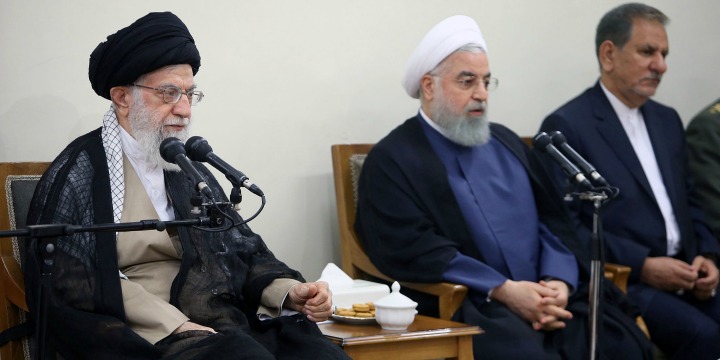Standing between Iran and the successful implementation of its plan is Israel. More than a few players are helping the Jewish state, chief among them the United States, but the brunt of the work is borne by Israel. It has hit around 200 Iranian targets in Syria since January of 2017 with some 800 missiles and bombs.
In this war, everything goes. From the most recent attacks, which curiously took place in broad daylight, to the various reports that have appeared in the foreign press, which we can assume don’t reach those news desks by chance. The bottom line is that Iran is the source of evil in the region and comprehensive action is required to stop it.
Behind these actions, it isn’t hard to spot Israel’s growing concern, not to mention frustration, over the fact that Iran is adhering to its plan of action to solidify its presence in the area. Amid the backdrop of the severe economic crisis in Iran and intensifying criticism at home is a real debate over the Quds Force and its activities, including within the regime’s more conservative wing. Still, as of now, there’s no change in this policy, which saps billions of dollars a year from the Islamic theocracy.
In the meantime — and we should hope into the future as well — Israel has the upper hand. The Iranians are still far from reaching their goals, mostly in Syria, and despite their declared intent, they have also failed to exact a price from Israel for its overt and covert countermeasures. The nature of these types of conflicts, however, is that they don’t end quickly or in a final score. Fortitude, endurance, and the willingness to pay the cost of victory, even if it isn’t complete, are all required.
From the security aspect, over the past year, the Israeli public’s attention has mostly been diverted to incendiary kites and balloons from Gaza, but the defense establishment has largely remained concentrated on Iran. We can assume that this will continue to be the case throughout the coming year, and constitute the main task of the IDF’s next chief of staff, slated to replace Lt. Gen. Gadi Eizenkot on January 1.
Yoav Limor is a veteran Israeli journalist and columnist for Israel Hayom.
 Police Stop Anti-Zionist Agitators From Accessing Florida University President’s Home as Students Revolt Nationwide
Police Stop Anti-Zionist Agitators From Accessing Florida University President’s Home as Students Revolt Nationwide Nearly One in Five Young People Sympathize With Hamas, 29% Say US Should Reduce or End Alliance With Israel: Poll
Nearly One in Five Young People Sympathize With Hamas, 29% Say US Should Reduce or End Alliance With Israel: Poll Ilhan Omar Silent After Daughter’s Arrest, Suspension for Role in Columbia University Anti-Israel Protest
Ilhan Omar Silent After Daughter’s Arrest, Suspension for Role in Columbia University Anti-Israel Protest Cultural Center Backed by Iran’s Revolutionary Guard Plans to Produce Films About Attack on Israel
Cultural Center Backed by Iran’s Revolutionary Guard Plans to Produce Films About Attack on Israel How Does Ilhan Omar Really Feel About Iran?
How Does Ilhan Omar Really Feel About Iran? This Passover, Combine Respect for Tradition with the Courage to Innovate
This Passover, Combine Respect for Tradition with the Courage to Innovate Israel’s Iran Attack Carefully Calibrated After Internal Splits, US Pressure
Israel’s Iran Attack Carefully Calibrated After Internal Splits, US Pressure Palestinian Cameramen Exposed in New Footage Documenting Oct. 7 Atrocities Side by Side with Terrorists
Palestinian Cameramen Exposed in New Footage Documenting Oct. 7 Atrocities Side by Side with Terrorists US Money to Convicted Terrorists; US Training to Aspiring Terrorists
US Money to Convicted Terrorists; US Training to Aspiring Terrorists Man Arrested in Paris After Iran Consulate Incident
Man Arrested in Paris After Iran Consulate Incident




 How Does Ilhan Omar Really Feel About Iran?
How Does Ilhan Omar Really Feel About Iran? Cultural Center Backed by Iran’s Revolutionary Guard Plans to Produce Films About Attack on Israel
Cultural Center Backed by Iran’s Revolutionary Guard Plans to Produce Films About Attack on Israel Ilhan Omar Silent After Daughter’s Arrest, Suspension for Role in Columbia University Anti-Israel Protest
Ilhan Omar Silent After Daughter’s Arrest, Suspension for Role in Columbia University Anti-Israel Protest Tehran Signals No Retaliation Against Israel After Drones Attack Iran
Tehran Signals No Retaliation Against Israel After Drones Attack Iran Nearly One in Five Young People Sympathize With Hamas, 29% Say US Should Reduce or End Alliance With Israel: Poll
Nearly One in Five Young People Sympathize With Hamas, 29% Say US Should Reduce or End Alliance With Israel: Poll